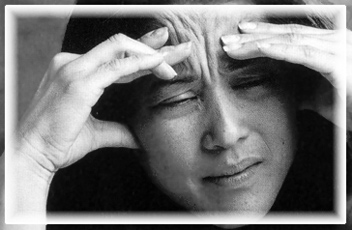God does not wrong people in any way;
rather it is people who wrong themselves.
(Qur'an, 10:44)
As romanticism causes mental and spiritual damage, so too does it cause physical deterioration. Most important are those apparent physical changes that a person is unable to hide. It is natural that if one experiences mental distress, tension and worry, these are bound to be reflected in his outward appearance. An emotional person's facial expressions, hand movements and tone of voice, all reveal the fact that his or her personality is governed by sentimentality.
In emotional people, we may recognise the physical traits that a "psychosomatic," or mental illness, can give rise to. When their bodies lose their physical resilience, they become weak, their immune system collapses and they either fall into one illness after another or an existing illness lingers without getting better.
Along with this sickness come many other changes: a person may lose his hair, or it may become prematurely grey and appear lifeless; the skin loses its moisture and elasticity and becomes dry, thickened, wrinkled and cracked, with the result that it becomes prone to infections. Moreover, because the cells are slow to regenerate, the person appears to have a permanent skin condition; his complexion is sallow and his eyes are dull. Therefore, it is evident that people with a tendency towards romantic melancholy, who continually create problems for themselves, become old early. Their bodies cannot stand the years of unrelenting tension, emotional flare-ups and mental unrest. As a consequence, they display signs of early ageing and other forms of serious physical deterioration.
 |  |
| The mental problems caused by sentimentality show themselves in physical conditions and various diseases. |
This is not the last of the physical damage that sentimentality can inflict on a person. His inner soberness and melancholy are reflected on his face and in his behaviour; all his dynamism, spirit, zest for life and love are seriously diminished and, consequently, so is his physical health. Because of the dullness of his eyes, the thinning and lifelessness of his hair, and the tension in his facial muscles, his expression is tense, gloomy and unpleasant. These are just a few of the physical changes that might take place. By the same token, people who are joyous, calm and composed, live much longer lives compared to those who are tense, stressed and prone to tears, and it is a scientifically proven fact that they are healthier.
Moreover, confronted with these physical changes, they make the nightmare they are living worse, instead of thinking about the transience of the world, their own helplessness within it, and submitting in faith to God. Because they do not consider the good that may come to them from growing old and its effects, they are despairing and beset by continual anxiety. Caught in this vicious circle, they are fixed in a burden that they are physically unable to eradicate. In fact, doctors have indicated that a number of illnesses are caused by sadness, worry and stress, and that the only cure is in finding joy and becoming more optimistic.
 |  |
It has been determined that a number of conditions-sleep and eating disorders, high or low blood-pressure, stomach, kidney and heart problems, asthma, allergies, eczema, psoriasis, migraines, cancer and many illnesses-have psychological origins connected to stress and depression. When the body is faced with stress, there is a biochemical reaction in which the consumption of energy is raised to the maximum level, and if this level of stress continues, an imbalance in body functions results.
Experts have written about the connection between stress and pain:
There is a significant correlation between stress and the tenseness and pain it causes. Stress-born tenseness causes the veins to be contracted, therefore preventing blood flow to certain regions in the brain. On the other hand, leaving a tissue bloodless for a while is direct cause for pain, because, possibly, the extra need for oxygen in the tense tissue as well as the lack of blood in the tissue stimulates special pain receptors. Meanwhile, adrenaline and noradrenalin-substances that affect the nervous system during stress-are released. These either directly or indirectly increase the tenseness of the muscles. Thus, pain causes tenseness, which in turn causes anxiety, which then leads to an increase in pain. 16
Stress and depression-related conditions, such as memory loss, attention deficit, lack of clear judgement and thinking, nervous twitches and uncontrollable behaviour, are recognisable in those people who have no faith, whereas believers are spiritually and mentally sound and well-balanced. This is because, true peace of mind and lasting joy come only from submitting to God and putting one's self in His hands. The believer's joy and peace of mind never abandon him, because he has submitted himself to God, and to the fate that God has created, and lives his life trusting in Him. By God's grace, he is spared this kind of physical deterioration.
The feeling of melancholy that romanticism instils in people is a terrible ailment which can only be removed by the submission and joy that faith brings. Believers, on their way to Paradise, will offer praise to God in these words:
They will say, "Praise be to God who has removed all sadness from us. Truly our Lord is Ever-Forgiving, Ever-Thankful." (Qur'an, 35:34)